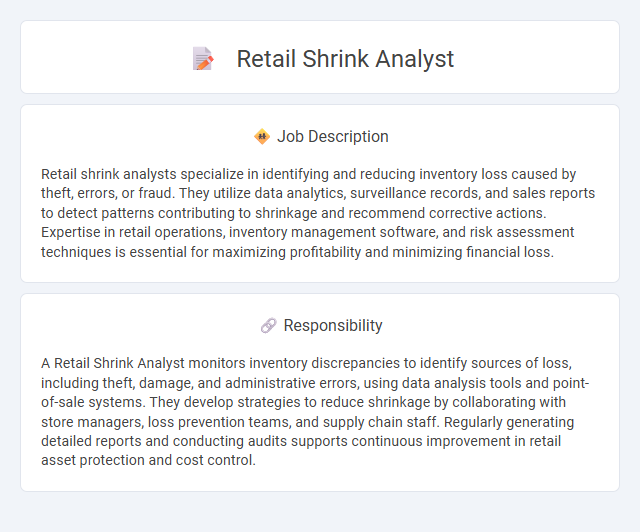
Retail shrink analysts specialize in identifying and reducing inventory loss caused by theft, errors, or fraud. They utilize data analytics, surveillance records, and sales reports to detect patterns contributing to shrinkage and recommend corrective actions. Expertise in retail operations, inventory management software, and risk assessment techniques is essential for maximizing profitability and minimizing financial loss.
Individuals with strong analytical skills and a detail-oriented mindset are likely well-suited for a Retail Shrink Analyst role due to the need to identify patterns of loss and recommend prevention strategies. People who thrive in environments requiring precise data interpretation and have patience for repetitive tasks may find the job rewarding. Candidates with limited interest in problem-solving or discomfort with numerical data might struggle with this position.
Qualification
A Retail Shrink Analyst requires strong analytical skills and proficiency in data analysis tools such as Excel, SQL, and business intelligence software. Experience in loss prevention, inventory management, and retail operations is essential to identify patterns and recommend strategies for reducing shrinkage. A background in finance, business administration, or supply chain management, combined with attention to detail and effective communication skills, enhances job performance.
Responsibility
A Retail Shrink Analyst monitors inventory discrepancies to identify sources of loss, including theft, damage, and administrative errors, using data analysis tools and point-of-sale systems. They develop strategies to reduce shrinkage by collaborating with store managers, loss prevention teams, and supply chain staff. Regularly generating detailed reports and conducting audits supports continuous improvement in retail asset protection and cost control.
Benefit
Retail shrink analysts likely improve profit margins by identifying patterns of inventory loss due to theft, errors, or supplier issues. They probably enhance operational efficiency through detailed data analysis and strategic recommendations. Their work may contribute to reducing overall shrinkage rates, increasing store profitability and stakeholder confidence.
Challenge
The role of a retail shrink analyst likely involves navigating complex challenges such as identifying patterns in inventory loss and fraud amidst vast data sets. Balancing the need for precise data analysis with the urgency of minimizing financial losses may present ongoing difficulties. Success in this position probably depends on the ability to anticipate evolving theft tactics and implement proactive shrink reduction strategies.
Career Advancement
Retail shrink analysts play a critical role in identifying and minimizing inventory losses through data analysis and loss prevention strategies. Advancing in this career often involves gaining expertise in forensic data analytics, mastering advanced retail analytics software, and developing strong cross-functional communication skills with supply chain and store operations teams. Professionals who demonstrate leadership in shrink reduction initiatives can progress to senior analyst, loss prevention manager, or corporate risk management roles, significantly enhancing their impact on organizational profitability.
 kuljobs.com
kuljobs.com